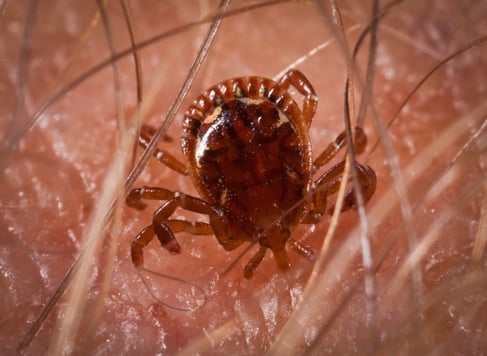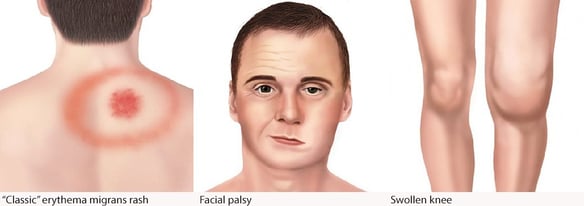Every time your child or dog comes in from playing outside where wooded areas are present, what is the first thing you do? If you thought “check for ticks,” you’d be in the same boat as many Monroe, NJ residents. Ticks are a serious concern as they become more prevalent during the warmer months beginning in spring. Being prepared for tick season and following the proper precautions is not always enough to keep you safe into the fall. Cooper Pest Solutions offers effective a Tick Prevention Service to guard your yard against tick activity. Read on to learn more about ticks, prevention, and how you can prevent disease spread by ticks.

Why do I have ticks?
Ticks begin to rear their ugly heads when the weather becomes warm. After emerging, they seek out a host to feed on for their primary food source. Unfortunately, ticks feed upon wildlife, humans, and pets such as dogs who spend time outside. Once a tick finds its host, they latch onto the skin and begin to burrow, using barbed-wire type feeding tubes to keep them in place. Ticks can feed off of their host for several days. When finished feeding, they drop off and continue to find a new host. This is commonly how blood borne diseases begin to spread.
Where do ticks come from?
“Any home along a natural wooded environment or field is very vulnerable to ticks,” Cooper Pest Solutions staff Entomologist Dr. Richard Cooper said. “Lawns that are not maintained, where the grass is above 4 inches, tends to promote tick activity as well.” According to Dr. Cooper, if your home borders a wooded environment or field, your property can be more prone to tick activity.
Where do my pets get ticks?
You are most likely to encounter ticks when walking in an area that is naturally infested with ticks, like a forest or tall grass. While some ticks will venture out into even the best kept lawns, your chances of seeing ticks are increased if your property borders wooded areas, or if you walk in such areas frequently. Pets, most commonly dogs, are susceptible to tick infestations when they roll around in your back yard, go for a walk or hike with you in the woods, play at a public dog park, or are exposed to wooded areas. Like humans, dogs have just as accessible flesh to become host to a tick.
Are ticks dangerous?
Ticks can be very dangerous because of the diseases they are capable of transmitting lyme disease, tularemia, and rocky mountain spotted fever along the east coast as well as in the Monroe, NJ area.
Lyme disease

Signs and symptoms of lyme disease Credit: CDC
According to lymedisease.org, “Lyme disease is a bacterial infection primarily transmitted by Ixodes ticks, also known as deer ticks. Lyme disease affects people of all ages. Once a tick has attached, if undisturbed it may feed for several days. The longer it stays attached, the more likely it will transmit the Lyme and other pathogens into your bloodstream.” This very serious disease can cause short term and long term damage to functioning in your daily life. According to the CDC, some symptoms include:
- Fever, chills, headache, fatigue, muscle and joint aches, and swollen lymph nodes
- Erythema migrans (EM) rash – see image above
- Severe headaches and neck stiffness
- Additional EM rashes on other areas of the body
- Arthritis with severe joint pain and swelling, particularly the knees and other large joints.
- Facial palsy (loss of muscle tone or droop on one or both sides of the face)
- Intermittent pain in tendons, muscles, joints, and bones
- Heart palpitations or an irregular heart beat (Lyme carditis)
- Episodes of dizziness or shortness of breath
- Inflammation of the brain and spinal cord
- Nerve pain
- Shooting pains, numbness, or tingling in the hands or feet
- Problems with short-term memory
If you suspect that you are experiencing the symptoms of lyme disease, please contact your doctor for further examination.
Tularemia
According to the CDC, Tularemia is not known to spread from person to person. People who have tularemia do not need to be isolated and people who have been exposed to the tularemia bacteria should be treated as soon as possible. However, the disease can be fatal if it is not treated with the right antibiotics.
Symptoms can include:
- Sudden fever
- Chills
- Headaches
- Diarrhea
- Muscle aches
- Joint pain
- Dry cough
- Progressive weakness
People can also develop pneumonia with chest pain, cough, and difficulty breathing. If you suspect that you may have tularemia, please contact your doctor for further examination.
How do I get rid of ticks?
Cooper offers a Tick Prevention Service that reduces the likelihood of tick entry into the yard by specifically treating the areas throughout the property where ticks are likely to harbor and breed. One of our skilled technicians will assess your needs based on your property and the surrounding environment and target treatment in the areas where ticks are already present. This treatment will ideally begin in April but can still be effective as long as it begins before the fall. The service includes four treatments (the first two in the first two months and the following two every other month) with a chemical that has been proven to be highly effective in the control of ticks.
It’s very important to stay informed about the latest industry developments in tick services in order to receive the best quality results. Some lawn care and landscaping companies engage in blanketed treatments with harsh chemicals, covering your entire yard with chemicals and hoping for the best. As an educated consumer, you should always be wary of these sorts of practices, ask lots of questions, and make sure that you are employing a trained pest professional to take care of your pest issues.
In addition to our Tick Prevention Service, we also offer mosquito control and services with our Mosquito-Free Program for ultimate yard and property protection from summer pests. To learn more about our mosquito program, click here.
Easy Tick Prevention Tips
Tick removal is not possible without the intervention of professional pest services. In order to prime yourself during tick season to avoid these unlucky encounters, follow these easy tips.
Ticks are often found in high grasses or along wood lines. When entering such areas, it is necessary that you take precautions to avoid any unwanted tick integration. To protect yourself from ticks when outside in wooded areas, wear light-colored pants and long-sleeved shirts. Also, remember to use bug spray with DEET, avoid wooded areas if possible, walk in the center of hiking paths, and avoid walking through leaf litter. Check for ticks after extended periods of time outside and look into tick preventatives for outdoor dogs and cats and remember to keep your lawn trimmed.
For more information about ticks and our targeted program, click here.
Our Commitment to Providing Wow Service
We pride ourselves on quality and efficiency for all pest treatments that we provide in Monroe, NJ. All of our staff go through extensive training to provide the WOW experience and the consistent service that our customers have come to expect. We stand by our services, so all of our programs including our tick services have a 100% satisfaction guarantee. To learn more please call us at 1-800-949-2667 or CLICK HERE to fill out our FREE estimate form.











